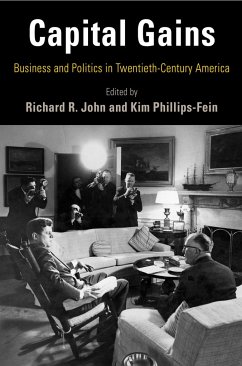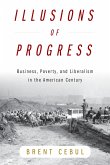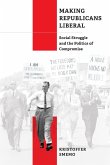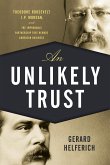Capital Gains
Business and Politics in Twentieth-Century America
Herausgeber: John, Richard R; Phillips-Fein, Kim
Capital Gains
Business and Politics in Twentieth-Century America
Herausgeber: John, Richard R; Phillips-Fein, Kim
- Gebundenes Buch
- Merkliste
- Auf die Merkliste
- Bewerten Bewerten
- Teilen
- Produkt teilen
- Produkterinnerung
- Produkterinnerung
Richard R. John is Professor of History at Columbia University. Kim Phillips-Fein is Associate Professor in the Gallatin School of Individualized Study at New York University.
Andere Kunden interessierten sich auch für
![Crusading for Globalization Crusading for Globalization]() Janick Marina SchaufelbuehlCrusading for Globalization54,99 €
Janick Marina SchaufelbuehlCrusading for Globalization54,99 €![Roaring Metropolis Roaring Metropolis]() Daniel AmsterdamRoaring Metropolis51,99 €
Daniel AmsterdamRoaring Metropolis51,99 €![Illusions of Progress Illusions of Progress]() Brent CebulIllusions of Progress40,99 €
Brent CebulIllusions of Progress40,99 €![Destructive Creation Destructive Creation]() Mark R WilsonDestructive Creation101,99 €
Mark R WilsonDestructive Creation101,99 €![Making Republicans Liberal Making Republicans Liberal]() Kristoffer SmemoMaking Republicans Liberal49,99 €
Kristoffer SmemoMaking Republicans Liberal49,99 €![Problems of Plenty Problems of Plenty]() Douglas R HurtProblems of Plenty28,99 €
Douglas R HurtProblems of Plenty28,99 €![An Unlikely Trust An Unlikely Trust]() Gerard HelferichAn Unlikely Trust21,99 €
Gerard HelferichAn Unlikely Trust21,99 €-
-
-
Richard R. John is Professor of History at Columbia University. Kim Phillips-Fein is Associate Professor in the Gallatin School of Individualized Study at New York University.
Hinweis: Dieser Artikel kann nur an eine deutsche Lieferadresse ausgeliefert werden.
Hinweis: Dieser Artikel kann nur an eine deutsche Lieferadresse ausgeliefert werden.
Produktdetails
- Produktdetails
- Verlag: University of Pennsylvania Press
- Seitenzahl: 312
- Erscheinungstermin: 21. Dezember 2016
- Englisch
- Abmessung: 231mm x 155mm x 30mm
- Gewicht: 590g
- ISBN-13: 9780812248821
- ISBN-10: 0812248821
- Artikelnr.: 44884922
- Herstellerkennzeichnung
- Libri GmbH
- Europaallee 1
- 36244 Bad Hersfeld
- gpsr@libri.de
- Verlag: University of Pennsylvania Press
- Seitenzahl: 312
- Erscheinungstermin: 21. Dezember 2016
- Englisch
- Abmessung: 231mm x 155mm x 30mm
- Gewicht: 590g
- ISBN-13: 9780812248821
- ISBN-10: 0812248821
- Artikelnr.: 44884922
- Herstellerkennzeichnung
- Libri GmbH
- Europaallee 1
- 36244 Bad Hersfeld
- gpsr@libri.de
Richard R. John is Professor of History at Columbia University. Kim Phillips-Fein is Associate Professor in the Gallatin School of Individualized Study at New York University.
Preface
—Kim Phillips-Fein
Introduction. Adversarial Relations? Business and Politics in
Twentieth-Century America
—Richard R. John
PART I. THE PROGRESSIVE ERA AND THE 1920s
Chapter 1. Trade Associations, State Building, and the Sherman Act: The
U.S. Chamber of Commerce, 1912-25
—Laura Phillips Sawyer
Chapter 2. Toward a Civic Welfare State: Business and City Building in the
1920s
—Daniel Amsterdam
PART II. THE NEW DEAL AND THE SECOND WORLD WAR
Chapter 3. The "Monopoly" Hearings, Its Critics, and the Limits of Patent
Reform in the New Deal
—Eric S. Hintz
Chapter 4. Farewell to Progressivism: The Second World War and the
Privatization of the "Military-Industrial Complex"
—Mark R. Wilson
Chapter 5. Beyond the New Deal: Thomas K. McCraw and the Political Economy
of Capitalism
—Richard R. John and Jason Scott Smith
PART III. THE POSTWAR ERA: ECONOMIC DEVELOPMENT
Chapter 6. "Free Enterprise" or Federal Aid? The Business Response to
Economic Restructuring in the Long 1950s
—Tami J. Friedman
Chapter 7. "They Were the Moving Spirits": Business and Supply-Side
Liberalism in the Postwar South
—Brent Cebul
Chapter 8. A Fraught Partnership: Business and the Public University Since
the Second World War
—Elizabeth Tandy Shermer
PART IV. THE POSTWAR ERA: LIBERALISM AND ITS CRITICS
Chapter 9. The Triumph of Social Responsibility in the National Association
of Manufacturers in the 1950s
—Jennifer Delton
Chapter 10. "What Would Peace in Vietnam Mean for You as an Investor?"
Business Executives and the Antiwar Movement, 1967-75
—Eric R. Smith
Chapter 11. Entangled: Civil Rights in Corporate America Since 1964
—Pamela Walker Laird
Notes
Contributors
Index
* * * * *
—Kim Phillips-Fein
Introduction. Adversarial Relations? Business and Politics in
Twentieth-Century America
—Richard R. John
PART I. THE PROGRESSIVE ERA AND THE 1920s
Chapter 1. Trade Associations, State Building, and the Sherman Act: The
U.S. Chamber of Commerce, 1912-25
—Laura Phillips Sawyer
Chapter 2. Toward a Civic Welfare State: Business and City Building in the
1920s
—Daniel Amsterdam
PART II. THE NEW DEAL AND THE SECOND WORLD WAR
Chapter 3. The "Monopoly" Hearings, Its Critics, and the Limits of Patent
Reform in the New Deal
—Eric S. Hintz
Chapter 4. Farewell to Progressivism: The Second World War and the
Privatization of the "Military-Industrial Complex"
—Mark R. Wilson
Chapter 5. Beyond the New Deal: Thomas K. McCraw and the Political Economy
of Capitalism
—Richard R. John and Jason Scott Smith
PART III. THE POSTWAR ERA: ECONOMIC DEVELOPMENT
Chapter 6. "Free Enterprise" or Federal Aid? The Business Response to
Economic Restructuring in the Long 1950s
—Tami J. Friedman
Chapter 7. "They Were the Moving Spirits": Business and Supply-Side
Liberalism in the Postwar South
—Brent Cebul
Chapter 8. A Fraught Partnership: Business and the Public University Since
the Second World War
—Elizabeth Tandy Shermer
PART IV. THE POSTWAR ERA: LIBERALISM AND ITS CRITICS
Chapter 9. The Triumph of Social Responsibility in the National Association
of Manufacturers in the 1950s
—Jennifer Delton
Chapter 10. "What Would Peace in Vietnam Mean for You as an Investor?"
Business Executives and the Antiwar Movement, 1967-75
—Eric R. Smith
Chapter 11. Entangled: Civil Rights in Corporate America Since 1964
—Pamela Walker Laird
Notes
Contributors
Index
* * * * *
Preface
—Kim Phillips-Fein
Introduction. Adversarial Relations? Business and Politics in
Twentieth-Century America
—Richard R. John
PART I. THE PROGRESSIVE ERA AND THE 1920s
Chapter 1. Trade Associations, State Building, and the Sherman Act: The
U.S. Chamber of Commerce, 1912-25
—Laura Phillips Sawyer
Chapter 2. Toward a Civic Welfare State: Business and City Building in the
1920s
—Daniel Amsterdam
PART II. THE NEW DEAL AND THE SECOND WORLD WAR
Chapter 3. The "Monopoly" Hearings, Its Critics, and the Limits of Patent
Reform in the New Deal
—Eric S. Hintz
Chapter 4. Farewell to Progressivism: The Second World War and the
Privatization of the "Military-Industrial Complex"
—Mark R. Wilson
Chapter 5. Beyond the New Deal: Thomas K. McCraw and the Political Economy
of Capitalism
—Richard R. John and Jason Scott Smith
PART III. THE POSTWAR ERA: ECONOMIC DEVELOPMENT
Chapter 6. "Free Enterprise" or Federal Aid? The Business Response to
Economic Restructuring in the Long 1950s
—Tami J. Friedman
Chapter 7. "They Were the Moving Spirits": Business and Supply-Side
Liberalism in the Postwar South
—Brent Cebul
Chapter 8. A Fraught Partnership: Business and the Public University Since
the Second World War
—Elizabeth Tandy Shermer
PART IV. THE POSTWAR ERA: LIBERALISM AND ITS CRITICS
Chapter 9. The Triumph of Social Responsibility in the National Association
of Manufacturers in the 1950s
—Jennifer Delton
Chapter 10. "What Would Peace in Vietnam Mean for You as an Investor?"
Business Executives and the Antiwar Movement, 1967-75
—Eric R. Smith
Chapter 11. Entangled: Civil Rights in Corporate America Since 1964
—Pamela Walker Laird
Notes
Contributors
Index
* * * * *
—Kim Phillips-Fein
Introduction. Adversarial Relations? Business and Politics in
Twentieth-Century America
—Richard R. John
PART I. THE PROGRESSIVE ERA AND THE 1920s
Chapter 1. Trade Associations, State Building, and the Sherman Act: The
U.S. Chamber of Commerce, 1912-25
—Laura Phillips Sawyer
Chapter 2. Toward a Civic Welfare State: Business and City Building in the
1920s
—Daniel Amsterdam
PART II. THE NEW DEAL AND THE SECOND WORLD WAR
Chapter 3. The "Monopoly" Hearings, Its Critics, and the Limits of Patent
Reform in the New Deal
—Eric S. Hintz
Chapter 4. Farewell to Progressivism: The Second World War and the
Privatization of the "Military-Industrial Complex"
—Mark R. Wilson
Chapter 5. Beyond the New Deal: Thomas K. McCraw and the Political Economy
of Capitalism
—Richard R. John and Jason Scott Smith
PART III. THE POSTWAR ERA: ECONOMIC DEVELOPMENT
Chapter 6. "Free Enterprise" or Federal Aid? The Business Response to
Economic Restructuring in the Long 1950s
—Tami J. Friedman
Chapter 7. "They Were the Moving Spirits": Business and Supply-Side
Liberalism in the Postwar South
—Brent Cebul
Chapter 8. A Fraught Partnership: Business and the Public University Since
the Second World War
—Elizabeth Tandy Shermer
PART IV. THE POSTWAR ERA: LIBERALISM AND ITS CRITICS
Chapter 9. The Triumph of Social Responsibility in the National Association
of Manufacturers in the 1950s
—Jennifer Delton
Chapter 10. "What Would Peace in Vietnam Mean for You as an Investor?"
Business Executives and the Antiwar Movement, 1967-75
—Eric R. Smith
Chapter 11. Entangled: Civil Rights in Corporate America Since 1964
—Pamela Walker Laird
Notes
Contributors
Index
* * * * *








